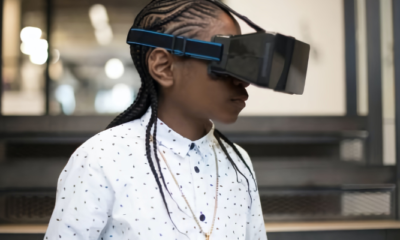Technology
Neurotechnology and Education: Exploring the Potential of Enhancing Learning and Cognitive Development

Are you looking for ways to boost your learning and cognitive development? Discover the exciting world of neurotechnology. This cutting-edge field combines neuroscience and technology to enhance our understanding of the brain and how we learn. From wearable devices that track brain activity to immersive virtual reality experiences, the applications of neurotechnology in education are limitless. Join us as we delve into this fascinating topic and explore how it can revolutionize the way we learn.
Introduction:
In today’s rapidly advancing world, the integration of technology in education has become increasingly vital. One promising field that holds immense potential is neurotechnology. By combining neuroscience and technology, neurotechnology aims to enhance learning and cognitive development. In this article, we will delve into the exciting possibilities that neurotechnology offers in revolutionizing education and empowering learners to reach new heights.
Understanding Neurotechnology:
Neurotechnology represents the intersection of neuroscience and technology. It encompasses a wide range of tools and techniques, such as neuroimaging, brain-computer interfaces (BCIs), virtual reality (VR), and wearable devices. These cutting-edge technologies enable us to monitor, diagnose, and treat neurological disorders while gaining valuable insights into brain function and cognition.
Personalized Learning through Brain Patterns:
One of the most promising applications of neurotechnology in education is personalized learning. By analyzing individuals’ unique brain patterns, educators can tailor instruction methods to meet the specific needs of each student. This personalized approach allows for more efficient and effective learning outcomes. Imagine a classroom where students receive targeted guidance based on their cognitive strengths and weaknesses, fostering optimal growth and understanding.
Improving Cognitive Abilities:
Neurotechnology also offers training programs designed to improve critical cognitive abilities. Individuals with conditions such as attention deficit hyperactivity disorder (ADHD) or those recovering from traumatic brain injuries can benefit greatly from these interventions. By leveraging neurotechnological tools, learners can enhance their attentional control, memory retention, decision-making skills, and more. This targeted cognitive training has the potential to unlock hidden potentials and support overall cognitive development.
Advancing Learning through Immersive Experiences:
Virtual reality (VR) is another exciting aspect of neurotechnology in education. By immersing students in realistic virtual environments, VR technology provides engaging and interactive learning experiences. Learners can explore historical events, dive into scientific phenomena, or practice real-world skills, all within a virtual setting. This hands-on approach enhances comprehension, retention, and application of knowledge, making learning more captivating and impactful.
Real-Time Feedback for Progress Tracking:
Neurotechnology also empowers educators with real-time feedback on learners’ cognitive processes. For instance, electroencephalography (EEG) headsets can detect changes in brainwaves as students perform tasks or absorb information. Through the use of machine learning algorithms, these signals generated by brain activity can be monitored, providing accurate insights into learners’ progress. This invaluable feedback allows educators to make timely adjustments and provide targeted support where needed, maximizing learning outcomes.
Challenges and Considerations:
While the potential of neurotechnology in education is vast, it’s essential to address certain challenges. Financial constraints may limit the widespread implementation of neurotechnological tools and programs in educational institutions. Adequate training for educators is crucial to ensure effective integration and utilization of these technologies. Additionally, privacy concerns related to the collection and analysis of brain data must be carefully managed to protect individuals’ sensitive information.
Conclusion:
Neurotechnology is poised to revolutionize education by enhancing learning and cognitive development. Through personalized instruction, cognitive training, immersive experiences, and real-time feedback, this exciting field offers innovative ways to engage and empower learners. As we navigate the future of education, it’s essential to embrace the potential of neurotechnology while addressing challenges and ensuring responsible and ethical implementation. By leveraging the power of neurotechnology, we can create a transformative learning environment that nurtures individual growth and propels education into a new era of possibilities.
































